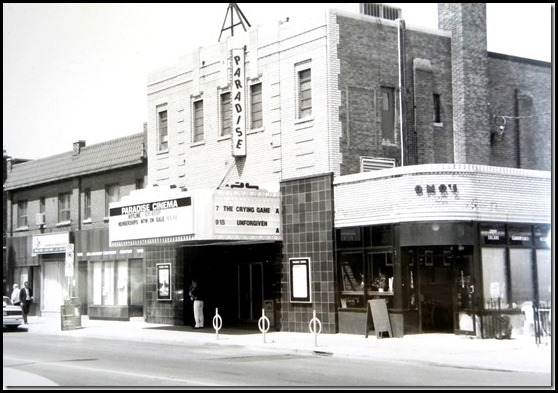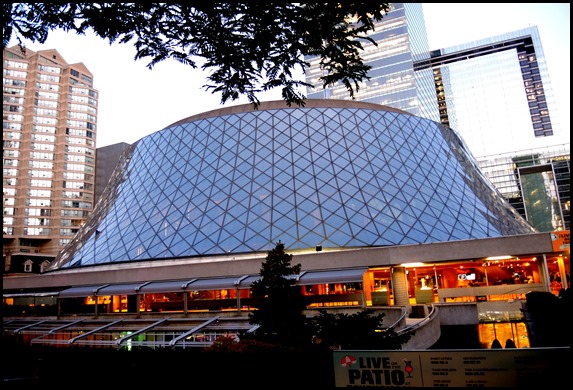This photo from the City of Toronto Archives (1150N-147) was likely taken about 1937, the year the Paradise Theatre opened, as the film starring the ice-skating star Sonja Henie was released in 1936. The building that contained the theatre still exists today, located at 1008 Bloor Street West, on the northwest corner of Bloor and Westmoreland. Its architect was Benjamin Brown, who also designed the Victory Theatre at Dundas and Spadina. Brown was one of the city’s finest 20th-century architects, having designed several Art Deco buildings on Spadina that remain in existence today—the Tower, Balfour and Reading buildings. Born in Lithuania in 1890, as a child he immigrated to Canada with his family. He received his education in Toronto. Most of his buildings reflect the Art Deco style, and the Paradise was no exception.
In 1909, a theatre named the Kitchener had been built on the site where the Paradise was to be located. The Kitchener had cost $3000 to build. When the Paradise opened in 1937, it was the height of the Great Depression and money was scarce. However, the theatre was instantly popular, as attending a movie was one of the few forms of entertainment that people could afford. The theatre contained 643 seats, with 466 in the auditorium and an additional 177 in the balcony, all of which had plush backs and leather seats. It possessed two 35mm projectors, broadloom covered floors, and air-conditioning. The original cost of the theatre was $110,000, not including the equipment. It also possessed a stage to accommodate live theatre or musical acts, and two dressing rooms for the actors, one to the left of the stage and the other to the right.
For a brief period in the 1980s, the theatre changed its name to Eve’s Paradise and screened movies that today would be referred to as soft-core porn. Most of these films could today be shown on primetime television. The theatre closed in 2006.
I was afraid that the Paradise might be demolished, even though it is officially listed as a Heritage Building. The laws projecting our heritage architecture are too weak to prevent them from a fateful meeting with a wrecker’s ball. However, I recently learned that the theatre is to be restored and will once more screen films. If these plans succeed, it will be reopened in 2015.
Interior view of the Paradise, looking toward the screen and stage. Ontario Archives, AO 2308
View of the auditorium, gazing to ward the rear of the theatre from the stage area. Ontario Archives AO 2306.
The theatre’s lobby, containing a rather quaint popcorn machine. Ontario Archives AO 2307
The busy section of Bloor Street where the Paradise Theatre is located (photo, July 2013)
View of the Paradise Theatre on the northwest corner of Bloor and Westmoreland.
View of the south facing facade and the marquee of the theatre (July 2013)
Entrance of the theatre in July of 2013. The pay telephone appears quaintly out of place.
Details on the south facade of the theatre in 2013.
View of the Paradise, looking east on Bloor Street in 2013.
To view the Home Page for this blog: https://tayloronhistory.com/
To view previous blogs about other movie houses of Toronto—old and new
https://tayloronhistory.com/2013/10/09/links-to-toronto-old-movie-housestayloronhistory-com/
To view links to other posts placed on this blog about the history of Toronto and its buildings:
https://tayloronhistory.com/2013/10/08/links-to-historic-architecture-of-torontotayloronhistory-com/
Recent publication entitled “Toronto’s Theatres and the Golden Age of the Silver Screen,” by the author of this blog. The publication explores 50 of Toronto’s old theatres and contains over 80 archival photographs of the facades, marquees and interiors of the theatres. It also relates anecdotes and stories from those who experienced these grand old movie houses.
To place an order for this book:
Theatres Included in the Book:
Chapter One – The Early Years—Nickelodeons and the First Theatres in Toronto
Theatorium (Red Mill) Theatre—Toronto’s First Movie Experience and First Permanent Movie Theatre, Auditorium (Avenue, PIckford), Colonial Theatre (the Bay), thePhotodome, Revue Theatre, Picture Palace (Royal George), Big Nickel (National, Rio), Madison Theatre (Midtown, Capri, Eden, Bloor Cinema, Bloor Street Hot Docs), Theatre Without a Name (Pastime, Prince Edward, Fox)
Chapter Two – The Great Movie Palaces – The End of the Nickelodeons
Loew’s Yonge Street (Elgin/Winter Garden), Shea’s Hippodrome, The Allen (Tivoli), Pantages (Imperial, Imperial Six, Ed Mirvish), Loew’s Uptown
Chapter Three – Smaller Theatres in the pre-1920s and 1920s
Oakwood, Broadway, Carlton on Parliament Street, Victory on Yonge Street (Embassy, Astor, Showcase, Federal, New Yorker, Panasonic), Allan’s Danforth (Century, Titania, Music Hall), Parkdale, Alhambra (Baronet, Eve), St. Clair, Standard (Strand, Victory, Golden Harvest), Palace, Bedford (Park), Hudson (Mount Pleasant), Belsize (Crest, Regent), Runnymede
Chapter Four – Theatres During the 1930s, the Great Depression
Grant ,Hollywood, Oriole (Cinema, International Cinema), Eglinton, Casino, Radio City, Paramount, Scarboro, Paradise (Eve’s Paradise), State (Bloordale), Colony, Bellevue (Lux, Elektra, Lido), Kingsway, Pylon (Royal, Golden Princess), Metro
Chapter Five – Theatres in the 1940s – The Second World War and the Post-War Years
University, Odeon Fairlawn, Vaughan, Odeon Danforth, Glendale, Odeon Hyland, Nortown, Willow, Downtown, Odeon Carlton, Donlands, Biltmore, Odeon Humber, Town Cinema
Chapter Six – The 1950s Theatres
Savoy (Coronet), Westwood
Chapter Seven – Cineplex and Multi-screen Complexes
Cineplex Eaton Centre, Cineplex Odeon Varsity, Scotiabank Cineplex, Dundas Square Cineplex, The Bell Lightbox (TIFF)











![cid_E474E4F9-11FC-42C9-AAAD-1B66D852[2] cid_E474E4F9-11FC-42C9-AAAD-1B66D852[2]](https://tayloronhistory.files.wordpress.com/2014/09/cid_e474e4f9-11fc-42c9-aaad-1b66d8522_thumb14.jpg)

